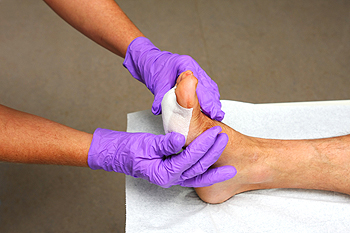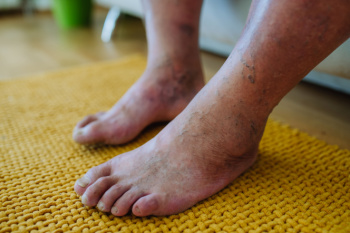Blog
Items filtered by date: July 2025
How Negative Pressure Wound Therapy Helps Diabetic Foot Wounds Heal

People with diabetes mellitus face a higher risk of foot wounds that are slow to heal due to poor circulation and nerve damage, which can slow the body’s natural healing process. One treatment used by some podiatrists is negative pressure wound therapy. This method involves placing a special dressing over the wound and connecting it to a gentle suction pump. The controlled suction removes excess fluids and helps draw healthy tissue toward the wound to promote faster healing. Negative pressure wound therapy also reduces swelling and lowers the risk of infection. By keeping the wound cleaner and improving blood flow, this treatment encourages the body to repair damaged tissue more effectively. Some patients find that using this therapy helps their wounds heal more quickly than with standard treatments alone. If you have a diabetic foot wound that is not improving, it is suggested you schedule a visit with a podiatrist to explore your treatment options.
Wound care is an important part in dealing with diabetes. If you have diabetes and a foot wound or would like more information about wound care for diabetics, consult with one of our podiatrists" from Practice. Our practitioners will assess your condition and provide you with quality foot and ankle treatment.
What Is Wound Care?
Wound care is the practice of taking proper care of a wound. This can range from the smallest to the largest of wounds. While everyone can benefit from proper wound care, it is much more important for diabetics. Diabetics often suffer from poor blood circulation which causes wounds to heal much slower than they would in a non-diabetic.
What Is the Importance of Wound Care?
While it may not seem apparent with small ulcers on the foot, for diabetics, any size ulcer can become infected. Diabetics often also suffer from neuropathy, or nerve loss. This means they might not even feel when they have an ulcer on their foot. If the wound becomes severely infected, amputation may be necessary. Therefore, it is of the upmost importance to properly care for any and all foot wounds.
How to Care for Wounds
The best way to care for foot wounds is to prevent them. For diabetics, this means daily inspections of the feet for any signs of abnormalities or ulcers. It is also recommended to see a podiatrist several times a year for a foot inspection. If you do have an ulcer, run the wound under water to clear dirt from the wound; then apply antibiotic ointment to the wound and cover with a bandage. Bandages should be changed daily and keeping pressure off the wound is smart. It is advised to see a podiatrist, who can keep an eye on it.
If you have any questions please contact our office located in Contact Us . We offer the newest diagnostic and treatment technologies for all your foot and ankle needs.
How an Ostomy Specialist Supports Your Care

An ostomy specialist is trained to help people manage life with an ostomy, which is a surgical procedure that creates an opening in the abdomen to allow bodily waste to pass through. The specialist can teach you how to care for the area where waste now leaves your body, helping you feel more confident with daily care. Specialists guide you in choosing the right pouching system, teach you how to protect your skin, and help you adjust your supplies as your body heals or changes shape. They also help if you experience skin problems or leaks around the pouch. Regular visits with an ostomy specialist can ease worries and answer questions as they come up. Whether you are new to an ostomy or have had one for years, getting personalized advice can make daily life easier and more comfortable. If you need support or have any concerns, it is suggested you schedule time with an ostomy specialist for guidance and care.
Ostomy Care and Support Services
Living with an ostomy can feel overwhelming, but with the right care and guidance, patients can regain comfort, confidence, and control in their lives. Our practice is dedicated to supporting individuals at every stage of their ostomy journey. Whether the surgery is new or long behind you, our specialists focus on helping you adapt comfortably and address any challenges that arise.
An ostomy is a surgically created opening that allows waste to leave the body through the abdomen. This can be necessary after certain medical conditions or surgeries involving the digestive or urinary system. Colostomy, ileostomy, and urostomy are common types of ostomies. Each requires specific care and attention, and our experienced team is skilled in managing all types.
Our specialist provides personalized care plans, beginning with detailed education on how to care for your stoma, or opening to the waste system, managing your pouching system, and protecting the surrounding skin. We also offer troubleshooting assistance for common issues such as leakage, skin irritation, and improper fit of appliances. Helping you achieve a secure and comfortable fit is one of our top priorities, as it can significantly impact your quality of life.
In addition to hands-on care, we believe education is empowering. Our team takes time to explain changes to your body, guide you through product options, and address emotional concerns with compassion. We understand that living with an ostomy is not only a physical adjustment but also an emotional one, and we are here to provide both clinical and personal support.
We work closely with your other possible healthcare providers to ensure seamless coordination of your care. From helping with pouching supplies to teaching skin protection techniques, our team is committed to helping you feel more at ease in your daily life.
Learn more about this procedure today. Our caring specialists are ready to help you navigate this journey with confidence and dignity.
What complications can occur with an ostomy?
Skin irritation, leakage, and stoma blockage are common concerns that may require medical attention or changes in pouching techniques.
Can you live a normal life with an ostomy?
Most people return to work, exercise, and travel after surgery, although adjustments in diet and pouch management are often necessary.
If you have any questions, please feel free to contact our office located in Contact Us . We offer the newest diagnostic and treatment technologies for all your foot care needs.
Understanding and Managing Diabetic Foot Problems

People with diabetes are more likely to develop foot issues due to poor circulation and reduced feeling in the feet. Cuts, blisters, or pressure points may go unnoticed and can quickly turn into serious wounds. Diagnosis begins with a thorough foot exam, including checking for sensation, skin changes, and blood flow. Special tests may be used to assess nerve function and evaluate the risk for ulcers or infection. Early detection is key to preventing complications, such as open sores or, in severe cases, tissue damage. Management focuses on daily foot care, proper footwear, and regular monitoring. If wounds are present, treatment may involve cleaning, dressing changes, and relieving pressure from the area. Advanced cases may require more intensive care. If you have diabetes and notice any changes in your feet, such as numbness, redness, or sores, it is suggested that you are under the care of a podiatrist who can help you to manage this serious condition.
Diabetic foot care is important in preventing foot ailments such as ulcers. If you are suffering from diabetes or have any other concerns about your feet, contact one of our podiatrists" from Practice. Our practitioners can provide the care you need to keep you pain-free and on your feet.
Diabetic Foot Care
Diabetes affects millions of people every year. The condition can damage blood vessels in many parts of the body, especially the feet. Because of this, taking care of your feet is essential if you have diabetes, and having a podiatrist help monitor your foot health is highly recommended.
The Importance of Caring for Your Feet
- Routinely inspect your feet for bruises or sores.
- Wear socks that fit your feet comfortably.
- Wear comfortable shoes that provide adequate support.
Patients with diabetes should have their doctor monitor their blood levels, as blood sugar levels play such a huge role in diabetic care. Monitoring these levels on a regular basis is highly advised.
It is always best to inform your healthcare professional of any concerns you may have regarding your feet, especially for diabetic patients. Early treatment and routine foot examinations are keys to maintaining proper health, especially because severe complications can arise if proper treatment is not applied.
If you have any questions, please feel free to contact our office located in Contact Us . We offer the newest diagnostic and treatment technologies for all your foot care needs.
